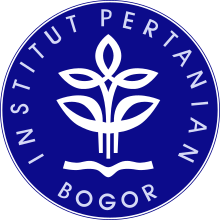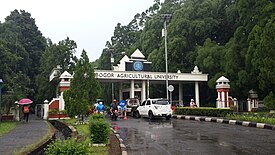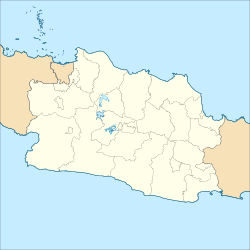IPB University
Institut Pertanian Bogor | |
 | |
Other name | Bogor Institute of Agriculture (lit.); Bogor Agricultural University (pre-2019) |
|---|---|
| Motto | Inspiring Innovation with Integrity |
Motto in English | Inspiring Innovation with Integrity in Agriculture, Ocean, Biosciences for a Sustainable World |
| Type | State university |
| Established | September 1, 1963 |
| Rector | Prof. Arif Satria, S.P., M.Si., Ph.D. |
| Location | , 6°33′14.6″S 106°43′24.3″E / 6.554056°S 106.723417°E |
| Campus | Both urban and rural total 6,651,635 m2 |
| Affiliations | ASAIHL[1] |
| Website | www |
 | |
IPB University[2][3] ([Institut Pertanian Bogor] Error: {{Langx}}: invalid parameter: |former name= (help), abbreviated as IPB) is a state-run agricultural university based in the regency of Bogor, Indonesia. IPB has long been considered one of the "Big 5" universities in Indonesia, along with University of Indonesia, Bandung Institute of Technology, Gadjah Mada University and Airlangga University.
History
[edit]The institute began as an agricultural school formed by the Dutch colonial regime in the early 20th century. After independence it was part of the University of Indonesia before becoming an independent institute on September 1, 1963.[4][5]

The first school in Bogor was established in 1876 under Rudolph Scheffer, under the name landbouwschool te Buitenzorg (agriculture school).[6] New schools for different fields were opened in the following years for Native Indonesians. The institute started in the early 20th century as a veterinary medicine and agricultural school.[4] Before World War II, the institutions were known as Middelbare Landbouwschool (secondary agricultural school), Middelbare Bosbouwschool (secondary forestry school) dan Nederlandsch Indiche Veeartsenschool (veterinary school).[4] The appointment of Hermanus Johannes Lovink as department director of agricultural education in 1910 marked a curriculum shift toward training for the government and private sides of colonial agribusiness, including basic biology classes augmented with practical education about cultivation techniques and technologies.[7] Lovink argued that department officials in the Ministry of Agriculture "needed to familiarize themselves with Javanese farming practices."[7]
In 1940, the Dutch government founded an Institution of Agricultural Higher Education in Bogor with the name Landbouw Hogeschool, which later on 31 October 1941 was called Landbouwkundige Faculteit (Agronomy Faculty). However, the school was closed down during the Japanese occupation (1942-1945). The Nederlandsch Indische Veeartsenschool remained in operation, but its name was changed to Bogōru jūigakkō (ボゴール獣医学校) (Bogor Veterinary School).[4]
After the declaration of independence in 1946, the Ministry of Social Welfare of the new Republic of Indonesia upgraded the Veterinary School in Bogor to the College of Veterinary Medicine (PTKH).[4] The Netherlands returned to Indonesia and retook control of the institution in 1947, thus Landbouwkundige Faculteit was reopened as the Faculteit Voor Landbouw-Wetenschappen, which had majors in Agriculture and Forestry. In 1948 the PTKH or College of Veterinary Medicine was changed to Faculteit voor Diergeneeskunde under Universiteit van Indonesië (later the University of Indonesia).[4]
After Indonesia gained its independence in 1950, Landbouw-wetenschappen became the Faculty of Agriculture of the University of Indonesia, with three departments — Socio-Economics, Physical Sciences, and Forestry. In 1957 the Department of Land Fishery was formed. Meanwhile, Faculteit voor Dieergeneeskunde became the Faculty of Veterinary Medicines and Animal Husbandry.[4]

IPB was founded on September 1, 1963 by the decision of the Minister of Science and Higher Education No. 92/1963 and was approved by President Sukarno's decree No. 279/1965.[5] At the time, the two faculties of University of Indonesia which is in Bogor were separated into an independent institution. Five faculties as the initial faculties at the establishment including Agriculture, Veterinary Medicine, Fisheries, Animal Science, and Forestry.

IPB was founded on September 1, 1963 by the decision of the Minister of Science and Higher Education No. 92/1963 and was approved by President Sukarno's decree No. 279/1965.[5] At the time, the two faculties of University of Indonesia which is in Bogor were separated into an independent institution. Five faculties as the initial faculties at the establishment including Agriculture, Veterinary Medicine, Fisheries, Animal Science, and Forestry.
Recent events
[edit]On December 26, 2000 the Indonesia government changed IPB's autonomy status to a state-owned university.
In 2005, IPB applied the minor and major system instead of the national curriculum system.[8][9] This allow IPB students to take more than one department field.[8]
Symbol and flags
[edit]Logo and philosophy
[edit]The logo consist of "Institut Pertanian Bogor" text, a tree with three branches and five leaves, and an open book which are all lined by a white circle on a blue background. The logo reflects IPB as an academic institution, source of knowledge and technology, with the "Tridarma Perguruan Tinggi" obligation.
The basic blue color symbolizes IPB as a science and technology university, the open book symbolizes IPB as a source of knowledge, the circle symbolizes that science has no limits and always growing, the three branches growing from the book symbolize Tridarma Perguruan Tinggi (IPB's three commitments: Education, Research, and Community Service), and the five leaves represent the first five faculties of IPB and symbolize Tridarma Perguruan Tinggi which is based on Pancasila.[10]
Campuses
[edit]- IPB Dramaga Campus[11]
- IPB Baranang Siang Campus[11]
- IPB Gunung Gede Campus[11]
- IPB Cilibende
- IPB Taman Kencana
- IPB Sukabumi
Faculties, departments, and studies
[edit]
IPB consists of eleven faculties or schools providing ranges of undergraduate and postgraduate program.[12] IPB in 1972 implemented a four-year undergraduate curriculum and opened the first graduate school in Indonesia in 1975.
IPB new undergraduate students are required to pass a Common First Year Program before entering any faculties or department although they are enrolled as a student of specific faculties and department.[13] The regulation not apply to vocational (diploma) and graduate programs.
| Faculty/School | Undergraduate and Graduate Studies |
|---|---|
| Faculty of Agriculture
Departments: |
Bachelor Degree |
| Master Degree | |
| Doctoral Degree | |
| School of Veterinary Medicine and Biomedical Sciences | Bachelor Degree
|
Veterinary Clinical Degree
| |
Master Degree
| |
Doctoral Degree
| |
| Faculty of Fisheries and Marine Sciences
Departments: |
Bachelor Degree |
| Master Degree | |
| Doctoral Degree | |
| Faculty of Animal Science
Departments: |
Bachelor Degree |
| Master Degree | |
| Doctoral Degree | |
| Faculty of Forestry and Environment
Departments: |
Bachelor Degree |
| Master Degree | |
| Doctoral Degree | |
| Faculty of Agricultural Technology
Departments: |
Bachelor Degree |
| Master Degree | |
| Doctoral Degree | |
| Faculty of Mathematics and Natural Sciences
Departments: |
Bachelor Degree |
| Master Degree | |
| Doctoral Degree | |
| Faculty of Economics and Management
Departments: |
Bachelor Degree |
| Master Degree | |
| Doctoral Degree | |
| Faculty of Human Ecology
Departments: |
Bachelor Degree |
Professional Degree
| |
| Master Degree | |
| Doctoral Degree | |
| Vocational School | Vocational Program Study
|
| School of Business | Bachelor Degree
|
Master Degree
| |
Doctoral Degree
| |
| Faculty of Medicine | Bachelor Degree
|
Medicine Clinical Degree
| |
| IPB Graduate School of Professional and Multidisciplinary Programs | Professional Degree
|
Master Degree
| |
Doctoral Degree
|
Green Campus
[edit]Starting on September 1, 2015 no ordinary fuel-vehicles are allowed to enter Green Campus Area. The authority provides 1,500 rental bikes, 44 electric cars and 20 gas-fueled buses. Electric cars and buses should have their fare paid electronically.[14]
Rankings
[edit]| University rankings | |
|---|---|
| Global – Overall | |
| QS World[15] | 426 (2024) |
| THE World[16] | 1201-1500 (2024) |
| UIGreenMetric Global[17] | 34 (2023) |
| Global – Life sciences and medicine | |
| ARWU Life sciences[18] | 401-500 (2023) |
| QS Agriculture and Forestry[19] | 51 (2023) |
| THE Life Sciences[16] | 801-1000 (2024) |
| Regional – Overall | |
| QS Asia[15] | 112 (2022) |
| THE Asia[16] | 401-500 (2023) |
The QS Asia University Rangkings 2022 has ranked Bogor Agricultural University as number 112. In 2023, Bogor Agricultural University was ranked 449th worldwide according to the Top QS World University Rankings 2023, as well as ranked 112th in the Top QS Asian University Rankings 2022 (fifth in Indonesia after Gadjah Mada University, Bandung Institute of Technology, University of Indonesia and Airlangga University).
Research Center
[edit]IPB oversees 22 research centers within the university, namely:
- Environmental Research Center (PPLH)
- Center for Agricultural and Rural Development Studies (PSP3)
- Center for Biological Resources & Biotechnology (PPSHB)
- Center for Engineering Science Development for Tropical Agriculture (CREATA)
- Southeast Asia Food and Agricultural Science and Technology Center (SEAFAST)
- Surfactant and Bioenergy Research Center (SBRC)
- Center for Regional Planning and Development Studies (P4W)
- Center for Coastal and Marine Resources Studies (PKSPL)
- Primate Research Center (PSSP)
- Center for Tropical Horticulture Studies (PKHT)
- Center for Tropical Animal Studies (CENTRAS)
- Human Resources Development Center (P2SDM)
- Tropical Biopharmaca Research Center (Trop BRC)
- International Study Center for Applied Economics & Finance (Inter CAFE)
- Center for Conflict Resolution Studies (Care)
- Center for Business Incubator and Entrepreneurship Development (IncuBie)
- Center for Climate Management, Opportunities and Risks in the Southeast Asia and Pacific Region (CCROM-SEAP)
- Center for Mining Reclamation Studies (Reklatam)
- Center for Disaster Studies
- Center for Sharia Business and Economic Studies (CI-BEST)
- Center for Gender and Child Studies (PKGA)
- Center for Agrarian Studies (PSA)
Seed Center
[edit]The university plans develop a Seed Center at Leuwikopo, Dramaga, Bogor due to Indonesia has to import seeds so far and facing a problem of seed supply. The center will develop agricultural seeds, plantation seeds, animal husbandry and fishery.[20]
Notable alumni
[edit]- Anton Apriantono, Minister of Agriculture of the Republic of Indonesia (2004–2009).[21][22][23]
- Dr. Ir. Hasjrul Harahap, Minister of Environment and Forestry of the Republic of Indonesia (1988–1993).[24][25]
- Iqbal Assegaf, Indonesian political activist, member of the People's Representative Council of Indonesia period 1998-2003 from the Golkar Party.[26][27]
- Nur Mahmudi Ismail, Minister of Environment and Forestry of the Republic of Indonesia (1999–2001), Mayor of Depok (2005–2010).[28]
- Mustafa Abubakar, State Minister for State Enterprises of the Republic of Indonesia (2009–2011).[29][30][31]
- Siti Nurbaya Bakar, Minister of Environment and Forestry of the Republic of Indonesia (2014–Present).[32]
- Susilo Bambang Yudhoyono, sixth President of Indonesia.[33]
- Ir. Suswono MM, Minister of Agriculture of the Republic of Indonesia (2009–2014).[34]
- Taufik Ismail (1935-), writer and poet.[35][36]
- Andi Hakim Nasoetion, scholar
- Sajogjo, founder of Indonesian poverty line
- Bungaran Saragih, Minister of Agriculture (2001–2004)
- Rokhmin Dahuri, Minister of Marine and Fishery (2001–2004)
- Andung A. Nitimihardja, Minister of Industry (2004–2005), Commissioner of PLN
- Prof. Dr. Ir. Sjarifuddin Baharsyah, Minister of Agriculture (1993–1998)
- Prof. Dr. Ir. Yustika Baharsyah, Minister of Agriculture (March 1998-December 1998) and Minister of Social
- Prof. Dr. Ir. Didik J Rachbini, Professor at the University of Indonesia and Member of Parliament (2004–2009)
See also
[edit]- List of universities in Indonesia
- Education in Indonesia
- Bogor Botanical Gardens
- List of forestry universities and colleges
References
[edit]- ^ Association of Southeast Asian Institutions of Higher Learning Official Website Archived July 4, 2015, at the Wayback Machine
- ^ Prasetia, Andhika (2019-01-30). "IPB Kini Rebranding Jadi 'IPB University', Apa Alasannya?". detiknews (in Indonesian). Retrieved 2019-03-09.
- ^ Media, Kompas Cyber (2019-01-30). "Nama Baru Janji Baru, IPB Berganti Nama Menjadi IPB University". KOMPAS.com (in Indonesian). Retrieved 2019-03-09.
- ^ a b c d e f g "History of IPB Embryonal Step (1941-1963)". Archived from the original on 2022-12-07. Retrieved 2013-09-01.
- ^ a b c History of IPB Growth phase Archived 2022-12-07 at the Wayback Machine.
- ^ "Scheffer, Rudolph Herman Christiaan Carel". National Herbarium of the Netherlands. Retrieved 29 January 2014.
- ^ a b Goss, Andrew (2011). The Floracrats: State-Sponsored Science and the Failure of the Enlightenment in Indonesia. United States of America: University of Wisconsin Press. p. 92. ISBN 978-0-299-24864-2 – via Open Edition.
- ^ a b IPB Undergraduate system.
- ^ IPB Undergraduate system evaluation.
- ^ "Symbol and Flag" (Press release). IPB. 25 September 2013. Retrieved 25 September 2013.
- ^ a b c "Lokasi Kampus IPB" (Press release) (in Indonesian). IPB. 20 April 2010. Archived from the original on 11 July 2010. Retrieved 20 June 2010.
- ^ "Faculties and Departments" (Press release). IPB. 25 September 2010. Archived from the original on 24 August 2011. Retrieved 25 September 2013.
- ^ "Visi dan Misi". Tingkat Persiapan Bersama IPB. Archived from the original on 27 September 2013. Retrieved 25 September 2013.
- ^ M. Sidik Permana (September 1, 2015). "IPB Bans Oil-fueled Vehicles".
- ^ a b "Bogor Agricultural University".
- ^ a b c "IPB University". Times Higher Education. 10 November 2021.
- ^ "UI GreenMetric World University Rankings 2023".
- ^ "Bogor Agricultural University". Shanghai Ranking.
- ^ "QS World University Rankings by Subject 2023: Agriculture & Forestry".
- ^ "IPB prepare to launch Seed Center". ANTARA News. Retrieved 25 September 2013.
- ^ "ndonesian Coffee Board Officially Formed (translated)". Republika Online. March 2018. Retrieved 21 September 2018.
- ^ "Respond to AGM Confusion, Three Pillar Employees (AISA) Convey ..." Tribun Jambi. Retrieved 21 September 2018.
- ^ "Indonesian rice executive arrested over mislabeling scandal". Nikkei Asian Review. Retrieved 21 September 2018.
- ^ "Ex minister launches memoir". Jakarta Post. 2008-12-01. Retrieved 2014-03-01.
- ^ "Never too late for Hasjrul to get doctorate degree". Jakarta Post. 2004-01-20. Archived from the original on 2014-03-02. Retrieved 2014-03-01.
- ^ "Iqbal Assegaf, Ketum PB PMII dari Labuha" [Iqbal Assegaf, Chairman of PB PMII from Labuha]. Indonesian Islamic Student Movement official website (in Indonesian). 12 February 2015. Archived from the original on 10 May 2018. Retrieved 6 July 2018.
- ^ "Tokoh PMII dari Masa ke Masa" [Chairman of PMII from time to time]. PMII Country (in Indonesian). 18 March 2018. Archived from the original on 6 July 2018. Retrieved 6 July 2018.
- ^ "Nur Mahmudi campaign pledges draw criticism". The Jakarta Post. 18 October 2010. Archived from the original on 19 October 2010. Retrieved 5 November 2010.
- ^ "Like the last lot". The Economist. 24 October 2009. p. 73.
- ^ Jayasuriya, Sisira and Peter McCawley in collaboration with Bhanupong Nidhiprabha, Budy P. Resosudarmo and Dushni Weerakoon, The Asian Tsunami: Aid and Reconstruction after a Disaster Archived 2012-03-16 at the Wayback Machine, Cheltenham UK and Northampton MA USA: Edward Elgar and Asian Development Bank Institute, 2010.
- ^ "Mustafa ready for unpopular policies". The Jakarta Post. 27 October 2009.
- ^ Rizal (27 October 2014). "Siti Nurbaya Menteri Lingkungan Hidup dan Kehutanan Sudah Terbiasa Pulang Malam". Poskota Online. Retrieved 22 April 2018.
- ^ Biography of President Susilo Bambang Yudhoyono Archived 25 December 2007 at the Wayback Machine
- ^ Kompas
- ^ Woodrich, Chris (2013). "Lilis Suryani's 'Gang Kelinci' as a Reflection of Social Realities in Indonesia (1957–1965)". Diglossia. 4 (2).
- ^ Teeuw, A. (1967). Modern Indonesian literature. The Hague: Martinus Nijhoff. pp. 253–254. OCLC 462738753.


